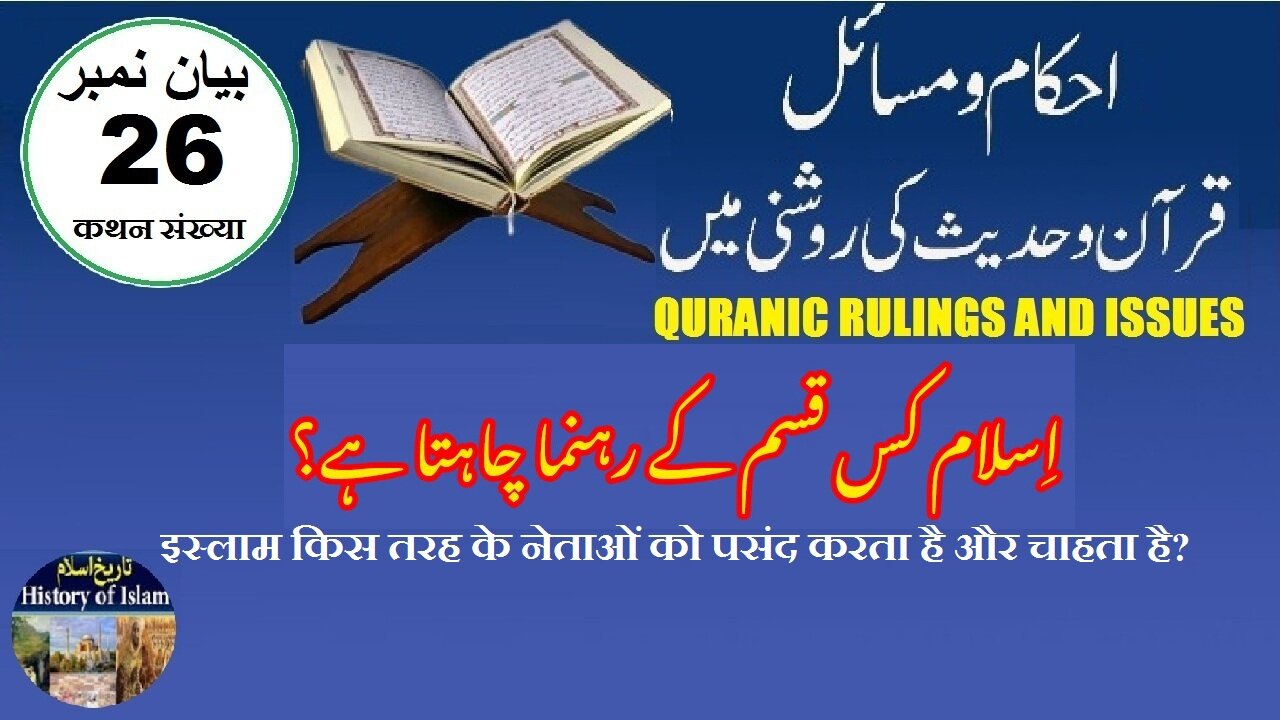Premium Only Content

What Kind of Leaders Does Islam like and Want اسلام کس قسم کے لیڈروں کو پسند اور چاہتا ہے؟
@islamichistory813 #what #kind #of #leaders #does #islam #want #islamicbayan
What Kind of Leaders Does Islam Want?
I begin in the name of Allah, the Most Gracious, the Most Merciful. , by the grace of Allah Almighty, today we are beginning Statement No. 26. and will be describe That What Kind of Leaders Does Islam Want?, So sisters, brothers friends and elders, Our aim is to learn and teach from the Quran and Sunnah, understand the rulings, reflect on history, and seek solutions to problems with divine guidance. May Allah Almighty make this statement beneficial and a source of light for all hearts.
Leadership in Islam is not about power, privilege, or status—it is about responsibility, justice, and service. The Qur’an and Hadith lay down clear principles for the qualities of leaders who guide a community. True Islamic leadership is a trust (amanah) that will be questioned on the Day of Judgment. The type of leaders Islam wants are those who uphold justice, serve the people, fear Allah, and protect the religion and rights of their followers.
The Qur’an emphasizes that positions of authority should only be given to those who are trustworthy and capable. Allah commands in Surah An-Nisa, verse 58:
“Indeed, Allah commands you to render trusts to whom they are due and when you judge between people to judge with justice. Excellent is that which Allah instructs you. Indeed, Allah is ever Hearing and Seeing.”
Here, leadership is described as a trust that must not be handed to the unqualified. Islam wants leaders who see authority not as a privilege but as a heavy responsibility.
The Prophet (PBUH) further warned in Sahih al-Bukhari Hadith No 893 and Sahih Muslim, Hadith No 142:
“When a man governs people and dies while he cheats them, Allah will forbid Paradise for him.”
Thus, Islam demands honest leaders who care for their people with sincerity.
Justice is one of the core qualities of an Islamic leader. The Qur’an states in Surah An-Nisa, verse 135:
“O you who have believed, be persistently standing firm in justice, witnesses for Allah, even if it be against yourselves or parents and relatives…”
Leaders must not show favoritism or oppress their subjects. The Prophet (PBUH) said in Sunan al-Tirmidhi Hadith No 1329:
“The most beloved of people to Allah on the Day of Judgment and the closest to Him will be the just leader. And the most hated of people to Allah and the farthest from Him will be the tyrannical leader.”
This shows that justice is the highest quality of leadership in Islam, and tyranny is the greatest betrayal of it.
Islamic leadership is about service, not privilege. The Prophet (PBUH) said in Abu Dawood, Hadith 2858:
“The leader of a people is their servant.”
He (PBUH) also demonstrated this himself—sharing food, clothing, and hardships with his companions, showing humility and accessibility. Unlike worldly kings, he (PBUH) lived simply and placed the welfare of his people above his own comfort.
Islam wants leaders who are conscious of accountability before Allah. The Prophet (PBUH) said in Sahih al-Bukhari Hadith No 893 and Sahih Muslim Hadith No 1829:
“Every one of you is a shepherd, and every one of you will be asked about his flock. The ruler is a shepherd over the people and will be asked about them.”
This hadith highlights that leadership is not a privilege but a responsibility that will be questioned on the Day of Judgment. Leaders who fear Allah will not betray their people.
The Prophet (PBUH) rejected tribalism in leadership and emphasized merit. When Abu Dharr (RA) asked for a leadership role, the Prophet (PBUH) told him:
Narrted in Sahih Muslim, Hadith 1825
“O Abu Dharr, you are weak, and it is a trust, and on the Day of Judgment it will be a cause of disgrace and regret except for the one who fulfills its obligations and discharges the duty required of him.”
This shows that leadership should not be given out of favoritism or lineage but based on capability, strength, and trustworthiness.
The Quran gives examples of righteous leadership:
As Allah Almighty said in Surah Yusuf, verse :55
Appoint me over the storehouses of the earth, I will surely be a knowledgeable guardian.
He demonstrated ability, honesty, and knowledge
and said in Surah As-Saff verse 26
O Dawud, We have made you successor on earth, so judge between people with truth and do not follow desire.
He was commanded to uphold the truth and resist personal desires.
These examples show that Islamic leaders must combine knowledge, justice, strength, and piety.
It is clear from the Quran and Sunnah that Islam wants leaders who:
rule with justice and fairness.
understand leadership as a trust, not a privilege.
Live humbly while serving their people.
Fear Allah's accountability more than worldly power.
Chosen for merit and ability, not wealth or lineage.
When such leaders exist, society prospers. But when corrupt, tyrannical leaders assume power, both the people and the rulers face the punishment of Allah.
Islamic leadership is a sacred trust, not an opportunity for power. The Quran said in Surah An Nisa verse 58, and 135, Surah Yusuf verse 55, and surah Sad verse 26 and Hadith (Sahih Al-Bukhari 893, Sahih Muslim 1829, Sunan Al-Tirmidhi 1329) emphasize the qualities of justice, piety, humility, and service. The leader is the shepherd of his people and is accountable to Allah for their well-being. Therefore, Islam wants leaders who govern with righteousness, justice, and fear of Allah—leaders who guide their people to good in both this world and the hereafter.
We conclude today's discourse with this humble supplication: O Allah, purify our hearts, accept our deeds, forgive our sins, and include us among Your grateful servants. Bless us in our time, our families, and our faith, and gather us under the shade of Your mercy on the Day of Judgment. Amen
#qurantafseer #hadithlessons #ilmdeen #quranwisdom #rozanabayan #sunnahteachings #imanibaatain #islamicknowledge #masailkaahal #quranstories #deenreminder #hadithseikhtalat #islamicsolutions #ilmokhikmat #dailybayan #sunnatseekhain #islamicevents #deenikahaniyan #quranmessage #islamiclessons #islamiwaqiat #bayanseries #quranreminder #islamicwisdom
=======================================
-
 13:26
13:26
ISLAMIC HISTORY
1 day agoIslamic History Episode 241 The Dethronement and Death of Mu'taz Billah معتز بلہ کی معزولی اور وفات
81 -
 LIVE
LIVE
Badlands Media
9 hours agoDEFCON ZERQ Ep. 011: RED OCTOBER BEGINS - ARK OF COVENANT - PRECIPICE
21,358 watching -
 2:08:09
2:08:09
The Charlie Kirk Show
3 hours agoTPUSA Presents This is The Turning Point Tour LIVE with Alex Clark and more!!
63.8K53 -
 DVR
DVR
Inverted World Live
3 hours agoMan Sees Creature in Loch Ness | Ep. 116
15.2K3 -
 LIVE
LIVE
PandaSub2000
12 hours agoLIVE 10pm ET | EXORCIST LEGION VR (Horror In VR!)
122 watching -
 LIVE
LIVE
SmashJT
22 minutes agoCollective Shout Keeps “HARRASSING” Me | Smashcast
30 watching -
 LIVE
LIVE
StevieTLIVE
1 hour agoWarzone Wins ALL Night w/ GloryJean
117 watching -
 LIVE
LIVE
Laura Loomer
5 hours agoEP146: Loomer EXPOSES Big Tech's Complicity With Anti-ICE Violence
812 watching -
 31:39
31:39
Standpoint with Gabe Groisman
1 day ago“Most People Have NO IDEA What Isolationism could do to America” Rep Rich McCormick Joins Standpoint
1.83K2 -
 LIVE
LIVE
MissesMaam
3 hours ago75% DONE WITH PERFECTION!!! | Stardew Co-Op 💚✨
42 watching